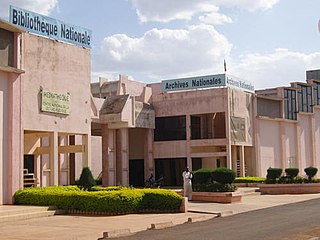Related Research Articles

The Bibliothèque nationale de France is the national library of France, located in Paris. It is the national repository of all that is published in France and also holds extensive historical collections.

A national library is a library established by a government as a country's preeminent repository of information. Unlike public libraries, these rarely allow citizens to borrow books. Often, they include numerous rare, valuable, or significant works. A national library is that library which has the duty of collecting and preserving the literature of the nation within and outside the country. Thus, national libraries are those libraries whose community is the nation at large. Examples include the British Library, and the Bibliothèque nationale de France in Paris.

The Bibliothèque de l'Arsenal in Paris has been part of the Bibliothèque nationale de France since 1934.
Jikji is the abbreviated title of a Korean Buddhist document whose title can be translated "Anthology of Great Buddhist Priests' Zen Teachings". Printed during the Goryeo Dynasty in 1377, it is the world's oldest extant book printed with movable metal type. UNESCO confirmed Jikji as the world's oldest metalloid type in September 2001 and includes it in the Memory of the World Programme.

The National Library of Mali is located in Bamako, Mali.

The Cabinet des Médailles, more formally known as Département des Monnaies, Médailles et Antiques de la Bibliothèque nationale de France, is a department of the Bibliothèque nationale de France in Paris. The Cabinet des Médailles is located in the Richelieu-Louvois building – the former main building of the library – on the Rue de Richelieu.

The École Nationale des Chartes is a French grande école and a constituent college of Université PSL, specialising in the historical sciences. It was founded in 1821, and was located initially at the National Archives, and later at the Palais de la Sorbonne. In October 2014, it moved to 65 rue de Richelieu, opposite the Richelieu-Louvois site of the National Library of France. The school is administered by the Ministry of National Education, Higher Education and Research. It holds the status of a grand établissement. Its students, who are recruited by competitive examination and hold the status of trainee civil servant, receive the qualification of archivist-paleographer after completing a thesis. They generally go on to pursue careers as heritage curators in the archive and visual fields, as library curators or as lecturers and researchers in the human and social sciences. In 2005, the school also introduced master's degrees, for which students were recruited based on an application file, and, in 2011, doctorates.

The National Library of Benin is the legal deposit library for Benin. Originally chartered in November 1975 and located in Ouidah, the library moved to a purpose built unit in the Ouando neighbourhood of Porto-Novo during the 1980s.
The Bibliothèque nationale du Burkina Faso is the legal deposit and copyright library for Burkina Faso. It was established on November 6, 1996.

The Lebanese National Library, located in Beirut, is the national library of Lebanon. It closed to the public in 1979 due to the Lebanese Civil War, and its surviving collections were placed in storage. Restoration of its volumes and planning for a new site began in 1999.
The National Library of Cameroon is the national library of Cameroon. It was established in 1966 and it is located in Yaoundé.
The Guinea National Library is the national library of Guinea, located in the capital city of Conakry.
The Bibliothèque Nationale de Mauritanie is located in Nouakchott, Mauritania in the building of the National Museum of Mauritania. The library has a collection of 10,000 volumes and employs 41 staff members. The library has seven branches.

The National Library of the Kingdom of Morocco is located in Rabat, Morocco with a branch in Tetouan. The Bibliothèque Générale was created in 1924. In 2003 it was renamed the "Bibliothèque nationale du Royaume du Maroc."

Following the recommendations of a Universal Periodic Review (UPR) in 2008, Burundi ratified the International Convention for the Protection of All Persons from Enforced Disappearance (ICCPED), Optional Protocol to the Convention on the Elimination of All Forms of Discrimination against Women (OP-CEDAW), and the Optional Protocol to the Convention against Torture and other Cruel, Inhuman or Degrading Treatment or Punishment (OPCAT).

The Bibliothèque de la Sorbonne is an inter-university library in Paris, France. It is situated in the Sorbonne building. It is a medieval institution of the Sorbonne, which evolved over the centuries as part of the University of Paris. It is a common library of Panthéon-Sorbonne University, Sorbonne-Nouvelle University, Sorbonne University, Paris Descartes University, and Paris Diderot University. It is administered by Panthéon-Sorbonne University as per a governing agreement signed among these universities in 2000.
National Library of the Democratic Republic of Congo is located in Kinshasa and was established in 1974 as an office within Ministry of Culture and Arts. In 1989, it became autonomous under presidential order.

André Danican Philidor the elder [French: l'aîné], a member of the Philidorit family of French musicians and referred to as André Danican Philidor le père after 1709, was a music librarian, instrumentalist, and composer. He is chiefly known as the organizer and principal copyist of what is now known as the Philidor Collection of French Baroque manuscript scores.
The following is a timeline of the history of the city of Bujumbura, Burundi.
References
- ↑ "History". National Library of Burundi. Retrieved 20 October 2016.
- ↑ "Bibliotheque Nationale du Burundi". nlsahopta.nlsa.ac.za. Archived from the original on 9 March 2018. Retrieved 20 October 2016.
- 1 2 3 4 Wedgeworth, Robert (January 1993). World Encyclopedia of Library and Information Services. American Library Association. p. 157. ISBN 978-0-8389-0609-5.
- ↑ "Adult literacy rate, population 15+ years (both sexes, female, male)". UIS.Stat. Montreal: UNESCO Institute for Statistics . Retrieved 25 August 2017.